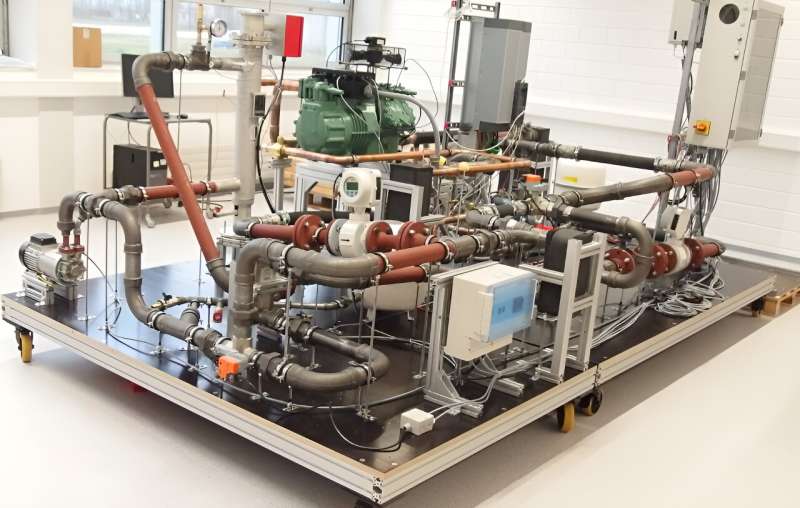This article has been reviewed according to Science X's editorial process and policies. Editors have highlighted the following attributes while ensuring the content's credibility:
fact-checked
trusted source
proofread
Electrifying industry with flexible heat pumps—a new approach may help companies generate carbon-free process heat

Whether producing foods, beverages, drugs, metals or paper or treating surfaces and textiles, industrial companies need process heat for many applications. Much of this is still generated by burning fossil fuels. Consequently, the generation of process heat accounts for a large proportion of greenhouse gas (GHG) emissions in the global industrial sector. In Switzerland, it is responsible for some 8% of total GHG emissions.
The industrial sector could already be generating process heat of up to 200 degrees Celsius in an eco-friendly manner, using industrial heat pumps that run on electricity generated from renewable sources. Yet despite this potential, heat pumps are still uncommon in industrial settings. This is because existing models tend to be expensive constructions that are custom-made for a specific industrial application and temperature.
Now, researchers from ETH Zurich and the Eastern Switzerland University of Applied Sciences in Buchs have developed a solution that enables heat pumps to generate heat cheaply and flexibly at various temperatures of up to 200 degrees Celsius. This fits the sector's needs much more closely than commercially available solutions, which is why numerous Swiss and international companies have already expressed an interest in the technology. The study is published in the International Journal of Refrigeration.
Harnessing heat from the environment
Heat pumps harness the energy stored in waste heat or in the ambient air, groundwater or soil. They generate heat for heating or process heat by evaporating a refrigerant fluid in a closed system and then passing the gas through a compressor to increase its temperature. The heat obtained in this process can then be used to heat buildings or for industrial processes.
In conventional heat pumps, the achievable temperature and temperature profile are largely determined by the choice of refrigerant. All the heat pump's components—from the evaporator and compressor to the condenser and expansion valve—are tailored to this refrigerant.
If a factory requires heat at different temperatures for multiple applications, this can currently be achieved only by using multiple heat pumps, each with a different refrigerant. This is both costly and inconvenient, which is why heat pumps have failed to make headway in the industrial sector.
Refrigerant blend boosts flexibility
André Bardow, Professor of Energy and Process Systems Engineering at ETH Zurich, believes his team has come up with a better solution, "Instead of a single refrigerant, we use a blend. This allows a heat pump to use different heat sources and generate different temperature profiles."
The composition of the refrigerant blend can be varied to cater to different applications. This is a key benefit for companies: instead of having to redesign the entire heat pump whenever they need a different temperature, they can simply modify the mixture, which is much simpler and cheaper.
The mixture itself consists of a traditional refrigerant and one further component. The temperature profile of the heat pump is dictated by the ratio of these two ingredients. "In principle, you can have any number of different profiles for industrial processes, as long as the temperatures don't exceed 200 degrees. That's the major advantage our technology offers," Bardow says.
Using a computer model to identify the right blend
To identify suitable components for the refrigerant blend, the researchers developed a computer model that simulates the heat-pump circuit with different variants of refrigerant mixture. "We extended the existing thermodynamic models for heat pumps by integrating the heat-pump components as well as the composition of the mixture into the optimization process," says Dennis Roskosch, Senior Scientist in Bardow's research group.
The researchers' model draws on over 200 million known synthetic molecules to simulate a blend of two molecules that offers the most efficient heat-pump performance.
Initial partners for pilot plant
Once the researchers found the optimum refrigerant blend, they confirmed its properties in the heat-pump laboratory at the Eastern Switzerland University of Applied Sciences. "The tests showed that our mixture increases the efficiency of a commercially available industrial heat pump by up to 25%, just as we predicted," says Professor Stefan Bertsch, who heads up the heat-pump laboratory. The researchers were also able to demonstrate how different compositions of the refrigerant mixture affect the temperature profile.
The team now hopes to provide even more concrete examples of how their technology could benefit specific industrial applications. The new heat pump is likely to be of particular interest in the food, pharmaceutical and chemical industries, where numerous processes require temperatures of less than 200 degrees.
At the same time, the researchers are working closely with heat-pump manufacturers such as MAN Energy Solutions or Scheco AG and with Swiss industry partners such as Lindt. The next step is to plan and build a pilot plant to carry out further tests.
More information: Leon P.M. Brendel et al, High-Glide Refrigerant Blends in High-Temperature Heat Pumps: Part 1 – Coefficient of Performance, International Journal of Refrigeration (2024). DOI: 10.1016/j.ijrefrig.2024.05.005

















